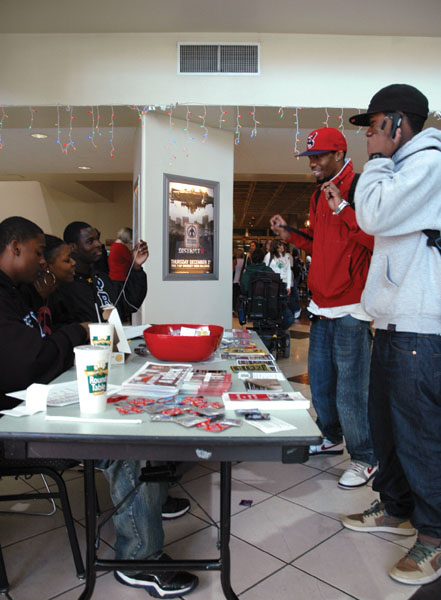Bringing HIV/AIDS awareness to campus

The HIV information table is part of a weeklong event to spread awareness.:
December 3, 2009
In addition to all the tests at Sac State this semester, students are now being offered one that may change their lives, an HIV test.
In honor of HIV awareness week, an information table has been set up in the University Union where volunteers will be giving out free condoms, testing sites, information and other promotional materials until the end of the week.
As a part of bringing more awareness to the campus community, campus sorority Delta Sigma Theta is having free, no-needle HIV testing starting at 1:30 p.m. Thursday in the University Union. No-needle HIV testing is done by cheek swabs that get tested for HIV antibodies rather than by drawing blood. All test results are confidential.
To protect from HIV, Ericka Dennis, senior government major and a member of Delta Sigma Theta, encourages people to use protection during sex and refrain from engaging in risky behaviors.
“Even though there are two people in the room, you have the ultimate control of your body, so speak up and demand protection,” Dennis said. “Just because he or she is the hottest person you have ever seen, that does not mean to make one foolish decision that can change your life.”
The fear of finding out whether one has HIV turns them off from getting tested, Dennis said.
“People are still afraid to talk to their partners, get regular checkups or enforce condom use every time,” she said. “There are a lot of myths about HIV and making sure people have the right information to reduce the stigma and increase the amount of people getting tested will hopefully decrease the amount of people being newly diagnosed.”
Volunteers at the booth are handing out information pamphlets from the Center for AIDS Research, Education and Services.
The center is a nonprofit clinic in the Sacramento region that provides testing, clinic services and counseling related to HIV/AIDS.
“We are excited that Sac State has come on board with us,” said Brad Boekstin, account manager at 3 Fold Communication with the center. “We want to let the general public know about HIV and that it exists out there, especially since younger generations are at a higher risk.”
The second HIV awareness week is co-sponsored by the PRIDE center.
“Last year, we were able to have about 200 people tested for antibodies that may be associated with the HIV virus, making us the most successful college campaign CARES has led in the Sacramento region, including UC Davis,” said Nicole Scanlan, coordinator of PRIDE center.
There will also be guest speakers and a panel discussion by HIV positive people, titled “Positively Speaking,” at 1 p.m. Thursday in the Hinde Auditorium.
The center will provide speakers who are clients of the clinic. The speakers will talk about their experiences living with HIV, along with professionals who work at the clinic who will break down the information about HIV.
To finish the awareness week, a talent show, hosted by Delta Sigma Theta, will be held on Friday in the Redwood Room to raise money for the center.
In addition to the talent showcase, information about the HIV and AIDS will be given to audience during the show.
“During the program, there will be facts and a guest speaker who will talk about her professional experience dealing with this epidemic,” Dennis said. “We want to showcase our local talent but still educate as much as we can.”
It is important to get tested to know your status because anyone can have it, Dennis said.
“Most (sexually transmitted infections) can be cured with a shot but HIV is long-term,” she said. “It does not care who you are and knowing your status will help stop this from spreading even more.”
The center reported that at least 5,000 people in the greater Sacramento area have HIV/AIDS, but about 1,000 people do not know that they have HIV.
Even if a person is nervous, Dennis said everyone should get tested.
“Sometimes that nervousness is a wake up call to them and if there are some encounters that may have put them at risk, then maybe that fear would encourage them to refrain from risky behaviors,” Dennis said.
To protect from HIV, Dennis and Scanlan encourage people to use protection during sex and refrain from engaging in risky behaviors.
The most important part of HIV awareness week is bringing awareness to Sac State and getting people tested.
“One person tested is better than no person getting tested,” Scanlan said. “Even if it’s 10 people, it’s a success.”




























































































































